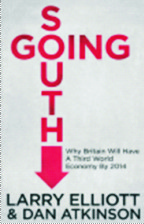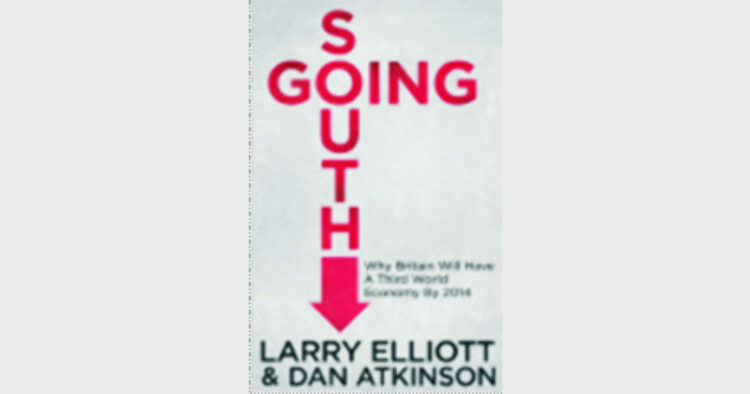Dr R Balashankar
Going South: Why Britain Will have a Third World Economy By 2014, Larry Elliott & Dan Atkinson, Palgrave Macmillan, Pp 389 (PB), £14.99 SUN setting on the Empire; Britain in dire straits, Britain a Third World country? That sounds unbelievable. The possibility is not only true but imminent, say Larry Elliott & Dan Atkinson in their book Going South: Why Britain Will Have A Third World Economy By 2014. It is not a mere conjecture or a projection based on statistics. The authors’ prognosis comes as a conclusion of unsparing and deep analysis. “Our contention is that the past five years bring to head trends of the past hundred years,” they say, listing the reasons — “industrial hollowing out has been exacerbated by globalisation; the growth of the financial sector provided credit to feed Britain’s debt habit; the end of the cold war hardened attitudes towards welfare and the division of economic spoils.”
SUN setting on the Empire; Britain in dire straits, Britain a Third World country? That sounds unbelievable. The possibility is not only true but imminent, say Larry Elliott & Dan Atkinson in their book Going South: Why Britain Will Have A Third World Economy By 2014. It is not a mere conjecture or a projection based on statistics. The authors’ prognosis comes as a conclusion of unsparing and deep analysis. “Our contention is that the past five years bring to head trends of the past hundred years,” they say, listing the reasons — “industrial hollowing out has been exacerbated by globalisation; the growth of the financial sector provided credit to feed Britain’s debt habit; the end of the cold war hardened attitudes towards welfare and the division of economic spoils.”
As the pages go by, a sense of cold reality sets in. Especially when one recognises several factors operating in India too — a chronic balance of payments deficit, a looming shortage of energy, a dysfunctional labour market, volatility in economic growth and a painful vulnerability to external event. “Around three-quarters of the growth in the boom years that preceded the financial crash came from financial services, the housing market, the construction sector, public spending and retail. All of them are struggling in an environment where household incomes are falling, banks are not lending, and the government is cutting spending. Policymakers are at their wits end after trying all the conventional means of boosting the economy, and quite a few unconventional ones as well.”
Larry and Dan, both economic journalists of long standing and great repute deliver the sad story of England in a gloves-off style, biting and stinging. And they are assertive and definite about their assessment and rubbish the rosy pictures politicians draw with words. According to them, “The United Kingdom is stuck in its deepest, longest and toughest recession since the Second World War.”
They give twelve points as “forensic evidence” to prove their case. The search for charismatic political leadership, (the most telling they say), apparent requirement of an all-encompassing political philosophy, public sector resembling an archipelago, vast pseudo-private sector controlling railways, water, gas and electricity engaged in conspiracies against the public, apparently in connivance with ministers, dense undergrowth of real private business engaged in dubious or downright worthless activities, more and more business taking place ‘off the radar’ — these are some of the points. In a telling comment that can suit India (a third world country) they say, “There is the third world notion that high officials possess a secret knowledge denied (to) the rest of us that not only informs policy but renders objections from ordinary people worthless.” Making fun of the finance system, Larry and Dan describe how the chancellor of exchequer makes a hue and cry about presenting budget whereas major decisions are announced outside it.
A lot has changed in Britain — the rules of the game, the guiding principles, the moral high ground once treaded by it, the sense of intellectual engagement have all given way to easy money, convenience, inequality. It allows foreign companies to take over their pride of possessions, yields to the European union on all issues, its education system seems to produce young men and women who are not fit to be employed, with the result that immigrants are walking away with those positions, the unemployment rate spiraling towards 25 per cent, the list is long. During the Olympics, nearly fifty per cent of the daily commuters in local trains were given leave from office to ‘manage’ the extra burden on the trains. “Britain has become something of a joke country where nothing seems to work properly. The nation where Stephenson produced the first proper railway now grinds to a halt when there is a dusting of snow. Trains don’t run, airports turn away passengers because the managers skimp on snow ploughs.”
At least 500 companies are working in the area of payday loans. This is a system where people take small loans to be returned on the payday. Interest rates on these loans can be very high, “with annual rates of 1000 per cent common for those borrowers who fail to pay off the debt speedily.” At least a million Britons use this service, for paying rent or mortgage. According to the book, around seven million Britons are falling back on some sort of credit to meet their housing costs. On power, fuel, industrial production and human resource, Britain is on the decline, steadily, speedily.
Larry and Dan discuss several minute issues that touch the common man, like the scam with pension fund. Today, the pensioners are dependent on the market as the fund has been exposed to private playing. (UPA has been itching to do that for long now, thanks to Mamata Banerjee stalled.) The education system does not prepare the youngsters to work. Tax evasion is one of the highest in the world, with an estimate that out of the global tax evasion of £2 trillion globally, UK share is £70 billion.
In 2009 and 2010 the British government borrowed £1 for every £10 produced by the economy, in a brazen act of economic profligacy. The last time it had done this when fighting a life and death war with Napoleon. Commented an observer, “Except perhaps in Africa and Ireland, no democratic country has ever imposed so great a burden on its ordinary citizens for the benefit and protection of that country’s wealthiest elite. The worst kleptocrats of Africa and Asia must be watching in astonishment. They never knew it could be this easy.”
Here is the final verdict. “For almost a century, the United Kingdom has deluded herself, first into believing that the days of global dominance will return, then into thinking that the symptoms of decline can be relatively easily tackled. More latterly, the conviction has been that the United Kingdom is on its way back from the trough reached in the third quarter of the twentieth century. These were all illusions, and by 2014 they will all be used up.” The only way out is to develop model and stick to it, they say. Larry Elliot is the economics editor, The Guardian. Dan Atkinson is the economics editor of The Mail on Sunday. They have together authored two other books previously.
The analysis of Britain’s state of economics by Larry and Dan is incisive, direct and merciless. One can only wonder if anyone in the British system is listening!
(Palgrave Macmillan Ltd, Houndmills Basingstoke, Hampshire, RG216XS)














Comments